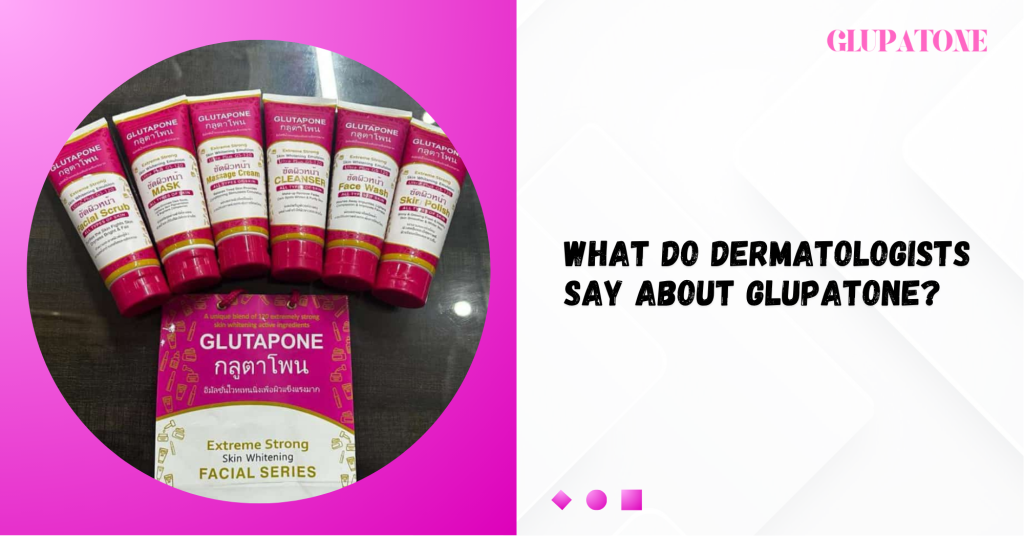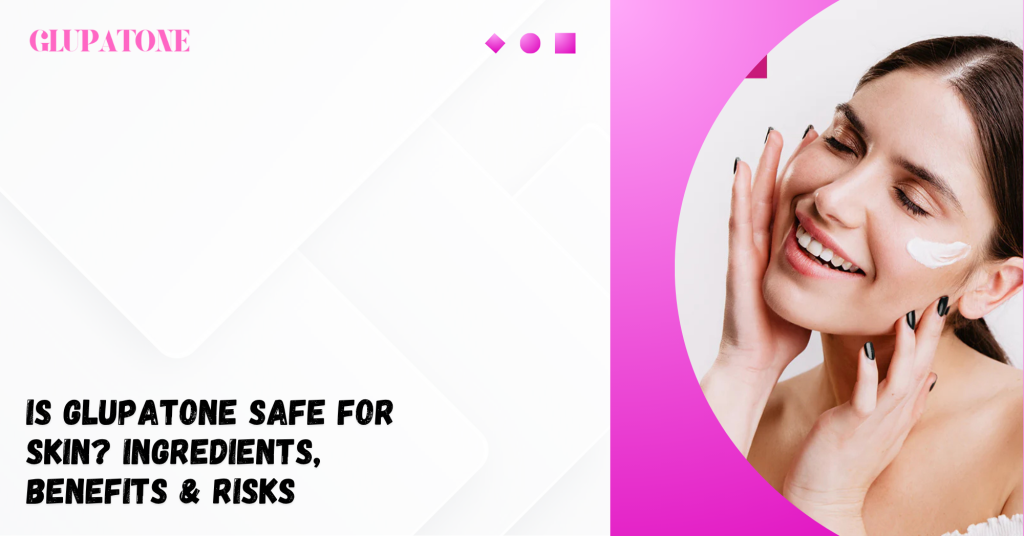Introduction to Glupatone and Its Purpose
Glupatone is a popular skin-brightening emulsion designed to help fade dark spots, reduce pigmentation, and give your skin a more even, glowing tone.
It’s often used by those who want a smoother, fairer complexion without harsh bleaching agents. Packed with brightening ingredients like Glutathione, Vitamin C, and Kojic Acid, it gently targets discoloration and dullness over time.
Is Glupatone Safe for Skin, you ask? well, whether you’re dealing with sun damage, uneven tone, or just want a radiant boost, Glupatone has become a trusted part of many skincare routines.
Common Reasons People Use It
People turn to Glupatone for all kinds of skin goals. Some of the most common uses include:
- Brightening overall skin tone
- Fading acne marks or dark spots
- Evening out patchy areas
- Reducing the appearance of dull or tired skin
It’s especially loved because it doesn’t feel too heavy on the skin and can be paired with other products like Homeo Cure Cream for even better results.
Is Glupatone Safe for All Skin Types?
Suitable Skin Types
In general, Glupatone works well for normal, oily, and combination skin. Its lightweight emulsion formula absorbs easily without clogging pores, which makes it ideal for people who want brightening without greasiness.
If your skin tolerates most products and you don’t have known sensitivities, you’re likely to get along just fine with Glupatone.
Who Should Be Cautious While Using It
While Glupatone is gentle for most, those with sensitive or allergy-prone skin should start slow.
If you’ve had past reactions to skincare with active brightening agents, it’s best to do a patch test before applying it to larger areas.
Also, if you’re currently using other strong treatments like retinoids or chemical exfoliants, check with a dermatologist before combining them with Glupatone to avoid irritation or over-drying.
What Are the Ingredients in Glupatone?
Key Active Ingredients
The main power players in Glupatone are:
- Glutathione – A master antioxidant that helps reduce melanin and improve skin clarity
- Kojic Acid – Known for lightening dark spots and reducing pigmentation
- Vitamin C – Brightens dull skin and protects against sun-related damage
These ingredients work together to help lighten dark areas naturally and gently over time.
Do These Ingredients Have Side Effects?
Most users tolerate Glupatone well, but like any skincare with active ingredients, there’s a small chance of:
- Mild tingling or redness
- Dryness or tightness, especially on sensitive skin
- Minor breakouts when first starting use
These reactions are usually temporary and improve as your skin adjusts. But if irritation continues, it’s best to pause use and consult a dermatologist.
Feel Radiant, Look Luminous—Let Glupatone Unveil Your Best Complexion Yet!
Glutathione, Vitamin C, and Kojic Acid—A Brightening Trio Your Skin Will Love!
What Skin Reactions Can Glupatone Cause?
Signs of a Negative Reaction
While Glupatone is safe for many people, some may experience mild side effects. Look out for:
- Redness or itching
- Tiny bumps or breakouts
- A burning or stinging feeling after applying
These could be signs that your skin is reacting to one or more of the active ingredients. It doesn’t mean Glupatone is harmful—it just may not suit your skin.
When to Discontinue Use
If your skin feels irritated for more than 2–3 days, or if symptoms get worse over time, it’s best to stop using the product. Wash your face with a gentle cleanser, apply a calming moisturizer, and give your skin time to heal.
If reactions are strong or painful, always check in with a dermatologist before trying again.
How to Use Glupatone Safely
Patch Testing and Why It Matters
Before using Glupatone all over your face or body, always do a patch test. Here’s how:
- Apply a small amount behind your ear or on your inner arm
- Wait 24 hours
- Check for any redness, itching, or rash
If everything looks fine, it’s likely safe to use.
Application Tips for Sensitive Skin
If your skin is sensitive, start slow:
- Use it every other day at first
- Apply a thin layer only at night
- Follow up with a basic, fragrance-free moisturizer
And always avoid applying it to broken, inflamed, or irritated areas.
Can Glupatone Be Used Long-Term?
Is It Safe for Daily Use?
Yes, many people use Glupatone daily, especially as part of their evening skincare routine. Just make sure you:
- Apply a thin layer
- Avoid using it with too many other active products
- Wear sunscreen if used during the day
Daily use helps maintain bright, even skin when used correctly.
Effects of Prolonged Use on the Skin
When used consistently but not excessively, Glupatone can help maintain a healthy glow. Overuse, however, might lead to:
- Skin dryness or peeling
- Sensitivity to sunlight
- Mild irritation over time
So give your skin breaks if needed, and listen to how it responds. Sometimes, less is more, even with brightening products

What Do Dermatologists Say About Glupatone?
Professional Recommendations
Most dermatologists agree: if used correctly and in moderation, Glupatone can be a safe option for skin brightening. They often recommend it for people dealing with:
- Uneven skin tone
- Mild hyperpigmentation
- Post-acne marks
Doctors usually suggest pairing it with sunscreen and a gentle routine to avoid irritation and help your skin respond better to the ingredients.
Clinical Concerns or Warnings
Dermatologists do caution against overuse. Using Glupatone too frequently or layering it with too many other strong products may:
- Cause dryness or peeling
- Lead to redness or irritation
- Disrupt your skin’s natural barrier
So, it’s always best to start slow, especially if you’re new to skin brighteners.
Myths vs. Facts About Glupatone Safety
Does It Thin the Skin?
No, Glupatone does not contain steroids, so it doesn’t thin your skin when used as directed. Thinning is usually linked to products with strong prescription ingredients—not brightening emulsions like Glupatone.
Is It a Bleaching Cream?
Not exactly. Glupatone brightens the skin by reducing dark spots and evening tone. It doesn’t bleach your skin like harsh chemical creams do. Think of it more as a tone enhancer, not a drastic changer.
Natural vs. Chemical Whitening: What’s the Truth?
Glupatone uses ingredients like Glutathione and Vitamin C, which occur naturally in the body or in food sources. These are considered gentle and safe for brightening. However, always read the label—some versions may include synthetic additives depending on where they’re made.
Support Healthy, Luminous Skin—Try Glupatone’s Gentle Yet Effective Formula!
Confident Skin Starts Here—Discover the Glow Within with Glupatone.
Conclusion: Should You Use Glupatone for Skin Brightening?
If you’re looking for a mild and gradual way to even out your skin tone, Glupatone is a great option. It’s generally safe, works well with other products, and can become a helpful part of your skincare routine, especially when used responsibly.
Just remember:
- Always patch test first
- Moisturize after use
- Never skip sunscreen
And if you ever feel unsure, ask a skincare professional before starting. Your skin deserves the best!
Frequently Asked Questions (FAQs)
Is Glupatone safe for sensitive skin?
Yes, but start with a patch test and use it less frequently at first.
Can Glupatone be used with other creams?
Yes, especially gentle moisturizers. Avoid strong actives or scrubs on the same day.
What happens if I use too much Glupatone?
You may experience dryness, peeling, or irritation. Reduce usage and apply a calming moisturizer.
Is Glupatone safe during pregnancy?
It’s best to consult your doctor before using any brightening products during pregnancy.
Can teenagers use Glupatone?
Yes, but only if they need it and their skin tolerates it well. Always start slow.
Does Glupatone have steroids?
No, original Glupatone does not contain steroids.
Is it safe to use Glupatone every day?
Yes, for most people. But if your skin gets dry or irritated, take breaks.
Can I use sunscreen with Glupatone?
Absolutely! It’s a must to prevent sun damage and protect your results.
Read More:

